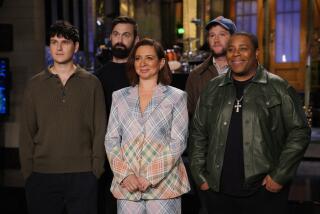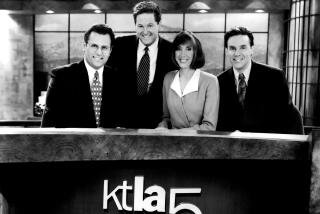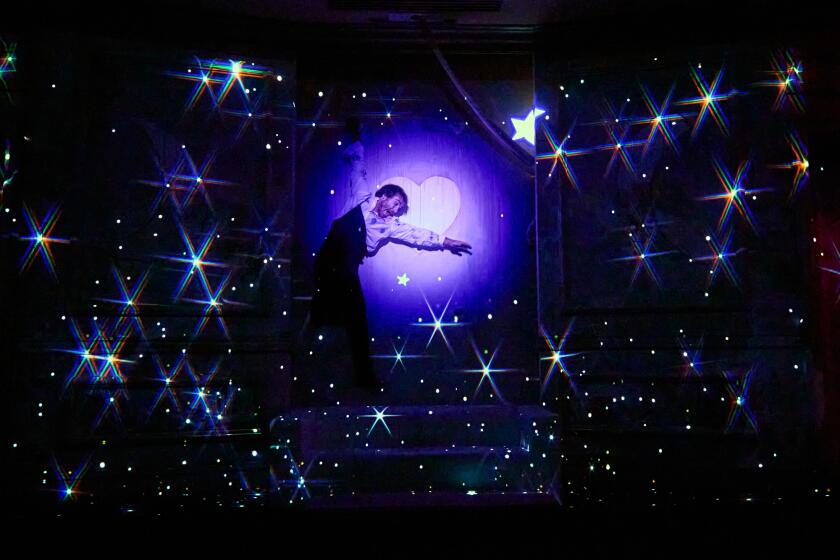Ungodly, glorious ‘Mass’
“Mass” is a mess. A holy and unholy mess. A mad, delirious, amazing mess.
Leonard Bernstein put everything he could, everything he was, into the theater piece that he wrote for the opening of the Kennedy Center in Washington, D.C., in 1971 and that was given an all-out production at the Hollywood Bowl on Thursday. And you just have to love him for his sheer audacity. A Jewish composer collaborates with the lyricist of “Godspell,” Stephen Schwartz, to turn the Roman Catholic liturgy -- a font of inspiration for composers practically since the dawn of Western music -- into an intemperate template of a historical moment.
It opens with an up-to-date Kyrie eleison delivered by singers on four-track tape -- watered-down Stockhausen building to a chaotic climax. Then comes a sentimental pop song sung by a Celebrant in bluejeans. Then a scat-sung “Du bing, du bang, du bong” on tape. Then a marching band, in full parade dress, bursts onto the scene blasting a Tournament of Roses-style Kyrie, street singers and children in its wake. And this is only the first few minutes of a two-hour work. (Did I mention the kazoos?)
Actually, you don’t have to love Bernstein for all this. Jacqueline Kennedy, who commissioned “Mass,” was said to have been nonplused by such a spectacle of excess, in which Broadway singers and dancers prance, electric guitars twang, the counterculture confronts the Church, a Celebrant has a breakdown, God and government are challenged, faith is lost and found, the Vietnam War protested. Many for whom Bernstein had been the great American music father figure felt betrayed by his self-indulgence.
But three decades later, “Mass” seems a brave, if still barmy, precursor to musical postmodernism in the way it embraces many of its era’s violently opposing musical attitudes. “Mass,” it turns out, was both embarrassingly of its time and provocatively ahead of its time.
The Bowl production, which was elaborate and expertly, thrillingly conducted by Marin Alsop, took “Mass” at face value, campiness and all. The campiness is still hard to take, maybe even harder to take than it was in 1971, given the way Broadway and pop singers have developed their hard-sell techniques into oversell. What “Mass” needs now is an innovative new theatrical approach, something that is either hot outrageousness or cool, minimal spirituality.
What it got at the Bowl, in a production directed by Gordon Hunt and choreographed by Kay Cole, was the sensibility of mainstream Broadway. But the Bowl is no place to experiment, and at least the production was also technically efficient mainstream Broadway, with a couple of moments of real theatrical effect.
The most strikingly theatrical element of the evening, besides the sheer massiveness of forces -- which included the Los Angeles Philharmonic, the Pacific Chorale, the Los Angeles Children’s Chorus, the Granada Hills High School Band, more than a dozen solo singers, a troupe of dancers and a boy soprano -- was the presence of Jubilant Sykes as the Celebrant.
The central figure in “Mass,” he enters with “A Simple Song,” the one vocal number that has gone on to have a life of its own. As he gradually dons priestly attire, the Celebrant responds to the life, the sex and the doubt on the street, to rock singers and blues singers and all those Broadway belters. He incites the chorus to anthems of faith. He asks the orchestra to pray, and it offers three serious, moving symphonic meditations.
But everything comes apart as the Celebrant has a crisis of faith, loses his sanity and, in a New Agey but movingly beautiful ending, finally leaves the commune to embrace the community at large. Sykes could be mannered and predictable when he reduced his voice to an understated rasp once or twice too often, but he is a vital presence onstage, moves brilliantly and takes vocal chances.
The Philharmonic found, in Eugene Olea, an appealing boy soprano, but the street singers -- the blues, rock, pop and show tunes crew -- proved a decidedly mixed bag, with the blues singing by far the best. The Philharmonic sounded thin in the big Meditations, but that may have been the result of amplification that favored the vocalists.
The video screens were nice to have for the soloists but distracting when the cameras were turned on the orchestra or tried to capture the larger stage picture. Certainly the operators should have known better than to zoom in on the worried choristers. But the cameras loved Sykes for the best of reasons.
One further novelty was the addition of new lyrics by Schwartz, toning down some corn but making little difference in the end. A “bed of spice,” for instance, became a “taste of spice.” For Schwartz, God made the world, the gnats and the fat cats. “And it was good, brother.” In its own crazy way, so is the mad, maddening, marvelous “Mass.”
More to Read
The biggest entertainment stories
Get our big stories about Hollywood, film, television, music, arts, culture and more right in your inbox as soon as they publish.
You may occasionally receive promotional content from the Los Angeles Times.







